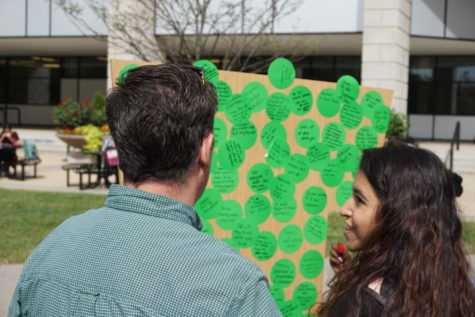Iowa State students talk about mental health
July 19, 2019
The stigma around mental health affects students’ ability to reach out for help for to problems that occur to the brain and the body.
In the United States, about one in five adults — 46.6 million — experience mental illness in a given year, according to the National Alliance on Mental Illness (NAMI). Instances of mental illness can even lead to heart disease, depression, anxiety, diabetes, osteoporosis and many other physical problems.
“Depression isn’t always feeling down and sad; depression can also be lack of enjoyment in your usual activities,” said Sarah Hotchkiss, a physician’s assistant in the Mental Health Department at Thielen Student Health Center.
Rebecca Staib, junior in kinesiology and health as well as the NAMI club president, said many students may not want to come forward about mental illness in fear that the stigma will follow them.
Hotchkiss said this problem may be consequential, as the brain and the body are both affected by mental illness.
Hotchkiss also said an example of this is when an individual reaches out to alcohol or other dangerous substances and activities as a coping mechanism. This can cause harm to the person’s health.
“Most mental illnesses have a lot of physical associations with it,” Staib said.
Sleep deprivation due to mental illness can affect the body, making the individual less energized and less eager. More specifically, Staib used the physical attributes brought on by anxiety—shaking hands, hyperventilation, sweating and heart racing.
When dealing with mental health, Hotchkiss recommends lifestyle changes. Having a sleep routine, being more social, better awareness about mental health, and exercising and meditating are some good ways to overcome mental illness, she said.
She also recommends on-campus services such as Thielen Student Health Center Primary Care, Student Counseling Services crisis walk-ins, the Dean of Students office for incidents where academics are affected by mental illness, along with many others on campus.
“There are just so many options in Ames for therapy as well, which is really, really nice to have,” Hotchkiss said.
Reaching out for help isn’t the only option; prevention is also a useful tool to combat mental illness. In order to prevent mental illness, Hotchkiss said there are many indicators to watch out for, including sleeping more or sleep insomnia, appetite changes, the feeling of being hopeless or worthless, and losing focus in class and lack of interest overall.
“Some people will stop going to class or other people will stop going out and hanging out with their friends and doing social activities; those are usually the more red flag symptoms,” Hotchkiss said.
Guan Lin, Iowa State alumni, noticed his red flag his junior year.
Lin started noticing he was getting overwhelmed with school work. So in that moment, he decided to seek sanctuary in the gym. He said that it is important to do other activities outside of school to take a break from studies.
“Find something you love to do every day, something that makes you laugh every day,” he said.
Abigail Molina, a sophomore majoring in psychology, said she struggles with stress and anxiety.
“It has impacted my schoolwork as well as my ability to go out and experience all the cool things a college campus has to offer,” she said.
Molina said she noticed that her friends were meeting new people and joining clubs while she was too nervous to go out. After that experience, she recommended that students do those things that she was nervous about doing.
“College isn’t easy for anyone, and once you make friends and build a support system, it can really help when school starts to get really stressful,” Molina said.
Lin said she believed that it is important to end the stigma around mental health.
“I feel like when most students think about mental health, they think of the worst and don’t want to talk about it,” Lin said.
However, Mercy Ommaid, a recent DMACC nursing school graduate and former Iowa State student, said that there is hope against this stigma.
“I feel like our generation understands that humans need more than good jobs and good nutrition and good finances,” Ommaid said. “We know that in order to excel, we must be mentally stable and always be working on that and growing our mental resilience,”
However, Hotchkiss said that anyone can and should receive help.
“Even if you are just struggling with day-to-day things, it still doesn’t hurt to talk to someone, and that’s kind of what we are here for and we enjoy doing,” she said.
Both Staib and Hotchkiss have different resources to reach out to on campus when it comes to prevention and recognition of a mental illness issue.
For students who are currently struggling with mental health, there are many hotlines available. Students can text “ISU” to 741-741 to reach the Text Crisis Hotline or call the Central Iowa Crisis Line at 844-258-8858 and the National Suicide Hotline at 800-273-8255.
















